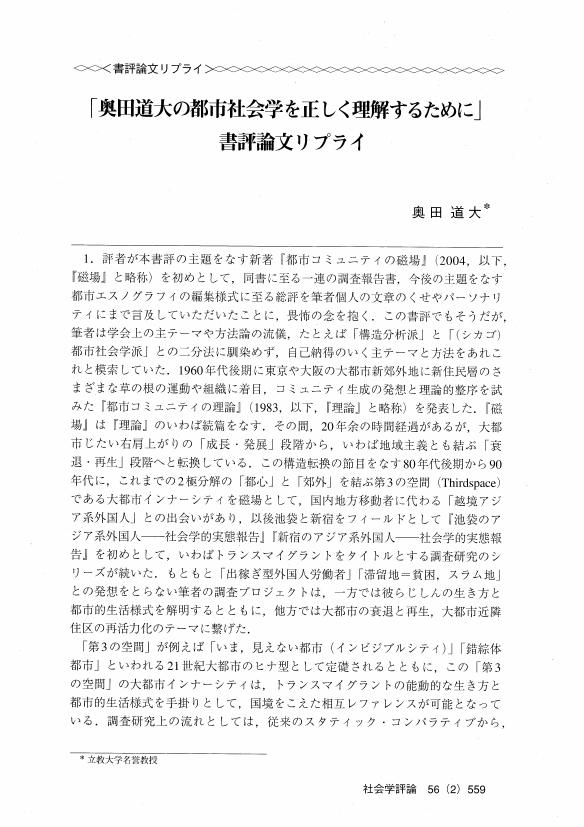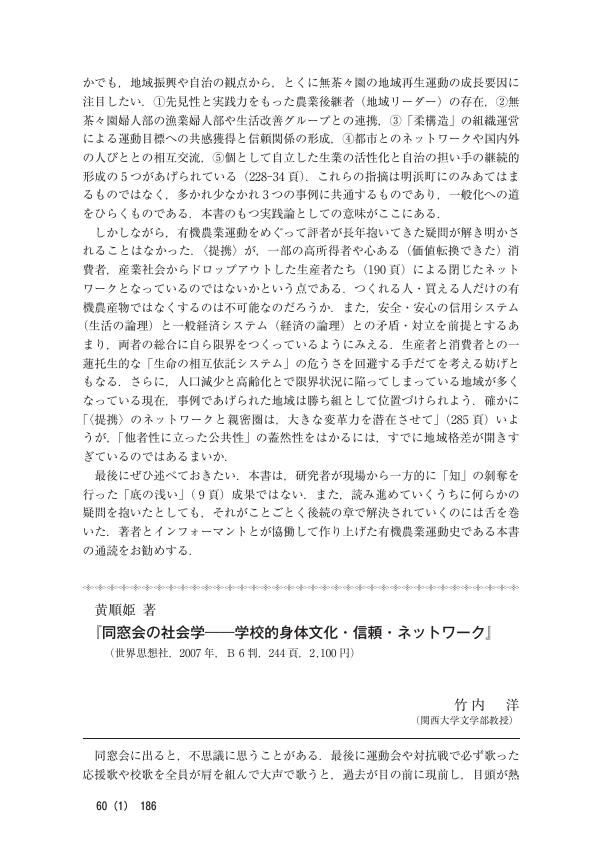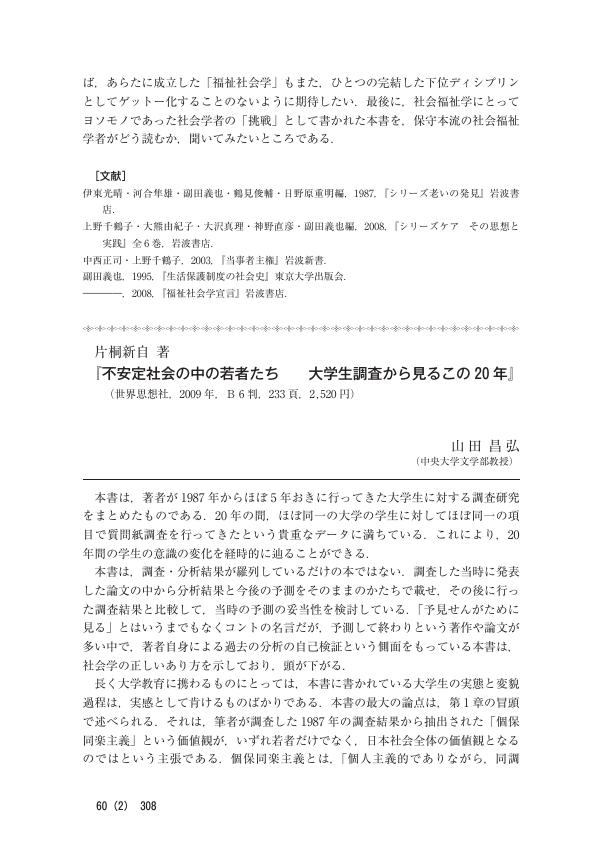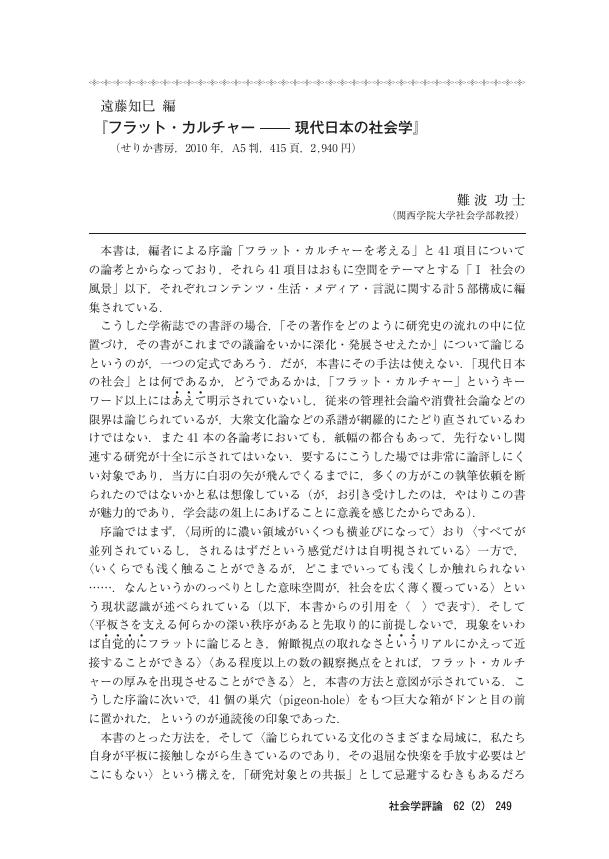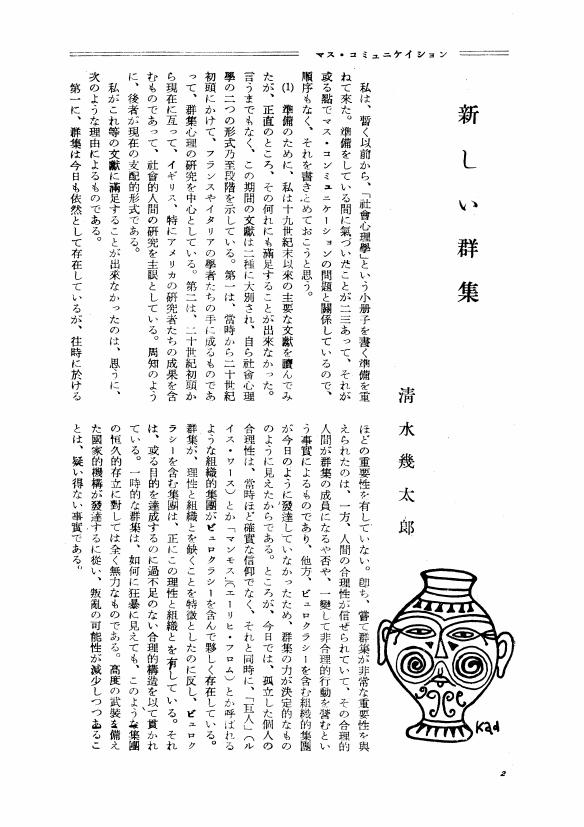1 0 0 0 OA 構造機能分析の論理構造
- 著者
- 原山 保
- 出版者
- 日本社会学会
- 雑誌
- 社会学評論 (ISSN:00215414)
- 巻号頁・発行日
- vol.22, no.4, pp.18-36,109, 1972-03-30 (Released:2009-11-11)
- 参考文献数
- 12
1 0 0 0 OA 機能分析の理論と方法
- 著者
- 小室 直樹
- 出版者
- 日本社会学会
- 雑誌
- 社会学評論 (ISSN:00215414)
- 巻号頁・発行日
- vol.20, no.1, pp.6-22,134, 1969-07-30 (Released:2009-11-11)
- 参考文献数
- 2
The purposes of this papar are to clarify the theoretical structure and methodological meaning of the functional analysis and lay a foundation for a systematic reconstruction of key terms of this analysis.In this paper, the functional analysis is understood as a kind of system analysis (interaction analysis) which uses a teleological way of reasoning for the explanation of the working mechanism of interaction processes. Then our problems are two. (1) To construct a coherent theory of the system analysis (2) To find a scientific meaning in the teleological way of explanation which has been notorious for its theological characteristics.(1) The key concept of the interaction analysis is that of the “equilibrium”. This concept is first imported from physics into social sciences and mostly explored in economic theory. The equilibrium concept in sociology should be somewhat wider than that in economics. Our first task is, therefore, to discuss how in what sense it is wider than its counterpart in economics. We also discuss about the sociological meaning of the existence theorem and stability condition of the system analysis in sociology.(2) We replace the notorious concept of “teleology” by a cybernetical way of explanation. The functional analysis is a kind of cybernetics which set a assumption that the social structure is forced to change if functional requisites are not significantly satisfied.This interpretation of the functional analysis also pave a way to the theory of social change. Functional requisites are not supposed to be axiomatically satisfied and the dissatisfaction of some functional requisites will necessarily leads to a dissolution of the social structure. This is the essential way of thinking of social change in terms of the functional analysis. We also show a way to a functional theory of conflict using the cybernetical way of reasoning.
1 0 0 0 OA デュルケームの儀礼論における集合力と象徴
- 著者
- 飯田 剛史
- 出版者
- 日本社会学会
- 雑誌
- 社会学評論 (ISSN:00215414)
- 巻号頁・発行日
- vol.35, no.2, pp.178-192, 1984-09-30 (Released:2009-10-19)
- 参考文献数
- 62
デュルケームの儀礼論を、サイバネティクスの観点より、「集合力-象徴モデル」を構成することによって、分析する。サイバネティクスとは、パーソンズによると「高情報・低エネルギーのシステムが、高エネルギー・低情報のシステムに有効な制御を行いうる諸条件に関わるもの」とされる。ここで、前項に宗教的信念体系を、後項に「集合力」を当てることによってモデル化を行う。集合力とは、人々のエネルギーが、社会的事実として客体化されたものである。またここで、象徴作用は、記号の媒介によって、集合力を喚起するはたらきと定義される (記号は、なんらかの物質的形式によって、イメージあるいは観念を、指示するはたらきと定義される) 。集合力は、象徴的制御のもとに、種々の社会機能に変換される。伝統社会の諸儀礼において、集合力は、宗教的象徴作用を介して、社会統合機能、集合表象維持機能に転換される。しかし、集合力は本来、無名のカオスの力であり、新たな象徴に方向づけられて、社会の変革・再統合の力にも転化しうるのである。
1 0 0 0 OA 組織分析の視角
- 著者
- 本橋 康子
- 出版者
- 日本社会学会
- 雑誌
- 社会学評論 (ISSN:00215414)
- 巻号頁・発行日
- vol.17, no.3, pp.55-72, 1967-01-30 (Released:2010-12-10)
- 参考文献数
- 79
It is a comparatively new phenomenon that the problem of organization, which had been treated as a part of group theory in sociology, began to be presented as organization theory. And we can say that in this fact the problem which organization theory itself has is presented. The aim of this treatise is to get some outlook about the basic view of organization theory by finding a clue in the theory of A. W. Gouldner who tried a methodological approach by laying the problems of organization on the basis of sociology. When Gouldner made distinction between the two prescriptions Max Weber had given to bureaucracy —bureaucracy as a technical system and that as a ruling system based on the legal office— as two patterns of bureaucracy, and presented the two famous concepts, “representative bureaucracy” and “punishment-centered bureaucracy”, he intended to exclude a pessimistic view of organization such as the contradiction between bureaucratization and democracy, and to pursue the accomplishment of rationality in organization. But the empirical studies in industrial organizations showed that “representative bureaucracy” is merely one functional mode and that it is “punishment-centered bureaucracy” that appears in social structure in general. As the result of it, the concept of organizational analysis was displaced by more general concepts such as “rational model” and “natural-system model”, and the tension between organizations and a structural change are explained by the tensional relation between these two factors which are immanent in the organization itself. “Rational model” belongs to the theoretical tradition of Saint-Simon=Max Weber and grasps organization as a rational technical system, while “natural-system model”. which originated from Comte and in which Parsons is a theoretical representative today, puts emphasis on the abiogenetic order in social system and develops a norm-centered theory of organization. Gouldner's criticism was made mainly on the static balance theory of “natural-system model”, and he seeks the motive power of revolution in the accomplishment of rationality in organization. However, the concept of “functional autonomy”, which he presented in an explanatory model of an organizational change, or as what synthesizes the both models, is consequently set up at the point nearer to “natural-system model”. That is, the independency of parts, which is guaranteed by this concept, makes a high adaptation to the threat from outside a system possible, by this it guarantees the stability of a system, and accordingly it is merely within this stable sphere. This appears with a more concrete form in the proposal of “applied sociology” to make a rational plan and control of society effectively. Though it is a natural conclusion of the organization theory which gave up the concept of class, in connection with the occurence of the discussion on the character and the problematic sphere of marxist sociology it should be examined in an objective sense that an approach toward a vital analysis has begun to be made from functionalism theory, which restricted its theme within a static analysis, in a form of organization theory.
1 0 0 0 OA 堀 喜望著「文化人類学」
- 著者
- 姫岡 勤
- 出版者
- 日本社会学会
- 雑誌
- 社会学評論 (ISSN:00215414)
- 巻号頁・発行日
- vol.5, no.4, pp.106-108, 1955-04-15 (Released:2009-11-11)
1 0 0 0 OA 社會學と民族學
- 著者
- 泉 靖一
- 出版者
- 日本社会学会
- 雑誌
- 社会学評論 (ISSN:00215414)
- 巻号頁・発行日
- vol.1, no.3, pp.2-9, 1950-11-30 (Released:2009-10-20)
- 参考文献数
- 17
1 0 0 0 OA 特集によせて
1 0 0 0 OA 「奥田道大の都市社会学を正しく理解するために」 書評論文リプライ
- 著者
- 奥田 道大
- 出版者
- 日本社会学会
- 雑誌
- 社会学評論 (ISSN:00215414)
- 巻号頁・発行日
- vol.56, no.2, pp.559-563, 2005-09-30 (Released:2009-10-19)
- 参考文献数
- 14
1 0 0 0 OA ラザースフェルトの潜在構造理論
- 著者
- 安田 三郎
- 出版者
- 日本社会学会
- 雑誌
- 社会学評論 (ISSN:00215414)
- 巻号頁・発行日
- vol.4, no.1-2, pp.190-194, 1954-01-30 (Released:2009-10-20)
1 0 0 0 OA 山田富秋著『フィールドワークのアポリア――エスノメソドロジーとライフストーリー』
- 著者
- 山北 輝裕
- 出版者
- 日本社会学会
- 雑誌
- 社会学評論 (ISSN:00215414)
- 巻号頁・発行日
- vol.63, no.1, pp.171-173, 2012-06-30 (Released:2013-11-22)
1 0 0 0 OA フランソワ・デュベ著, 山下雅之監訳, 濱西栄司・森田次朗訳『経験の社会学』
- 著者
- 宮島 喬
- 出版者
- 日本社会学会
- 雑誌
- 社会学評論 (ISSN:00215414)
- 巻号頁・発行日
- vol.63, no.1, pp.166-167, 2012-06-30 (Released:2013-11-22)
1 0 0 0 OA 仁平典宏著『「ボランティア」の誕生と終焉――<贈与のパラドックス>の知識社会学』
- 著者
- 安達 智史
- 出版者
- 日本社会学会
- 雑誌
- 社会学評論 (ISSN:00215414)
- 巻号頁・発行日
- vol.63, no.1, pp.175-176, 2012-06-30 (Released:2013-11-22)
1 0 0 0 OA 黄順姫著『同窓会の社会学――学校的身体文化・信頼・ネットワーク』
- 著者
- 竹内 洋
- 出版者
- 日本社会学会
- 雑誌
- 社会学評論 (ISSN:00215414)
- 巻号頁・発行日
- vol.60, no.1, pp.186-188, 2009-06-30 (Released:2010-08-01)
1 0 0 0 OA 片桐新自著『不安定社会の中の若者たち――大学生調査から見るこの20年』
- 著者
- 山田 昌弘
- 出版者
- 日本社会学会
- 雑誌
- 社会学評論 (ISSN:00215414)
- 巻号頁・発行日
- vol.60, no.2, pp.308-309, 2009-09-30 (Released:2012-03-01)
1 0 0 0 OA 古市憲寿著『希望難民ご一行様――ピースボートと「承認の共同体」幻想』
- 著者
- 鈴木 謙介
- 出版者
- 日本社会学会
- 雑誌
- 社会学評論 (ISSN:00215414)
- 巻号頁・発行日
- vol.62, no.2, pp.253-254, 2011-09-30 (Released:2013-11-19)
1 0 0 0 OA 遠藤知巳編『フラット・カルチャー――現代日本の社会学』
- 著者
- 難波 功士
- 出版者
- 日本社会学会
- 雑誌
- 社会学評論 (ISSN:00215414)
- 巻号頁・発行日
- vol.62, no.2, pp.249-250, 2011-09-30 (Released:2013-11-19)
1 0 0 0 OA 新しい群集
- 著者
- 清水 幾太郎
- 出版者
- 日本社会学会
- 雑誌
- 社会学評論 (ISSN:00215414)
- 巻号頁・発行日
- vol.2, no.2, pp.2-8, 1951-08-30 (Released:2009-11-11)
1 0 0 0 OA 戦間期における学生の読書実践
- 著者
- 後藤 美緒
- 出版者
- 日本社会学会
- 雑誌
- 社会学評論 (ISSN:00215414)
- 巻号頁・発行日
- vol.62, no.1, pp.51-68, 2011-06-30 (Released:2013-03-01)
- 参考文献数
- 30
本稿は,戦間期の学生団体である東京帝大新人会(1919-1929,以下新人会)が行った読書実践を論じる.その際,とりわけ諸活動を遂行していく中で新人会が得た「科学から空想へ」という着想に注目し,着想にいたる論理を分析することを通し,戦間期に高等教育を受けた人びとの社会運動が,いかなる可能性と挫折を有していたのかを明らかにする.機関誌や労働学校での講義といった新人会の読書実践から浮かび上がるのは,会員らの読書実践が社会的属性を超えた連帯の模索であったことである.会員らは読書を通じて,労働者や貧困層をとりまく劣悪な生活環境や労働状況を認識し,その中で生きる彼らもまた,同一の時代に生きる人々であることを自覚した.そして,読書を自らの社会的地位を強化する読み方と手段から,いわゆる社会的弱者を包摂する社会を改善するための手段へと展開した.その過程において彼らは,知識の送り手と受け手の立場が無限に交替することを経験し,諸活動の遂行の中で自らが働きかけた現状に対し,応答する責任に気づいた.テクストを用いることで現状を「科学」的に解釈し,さらにその解釈を新たな共同性の「空想」へと発展させた新人会の読書実践は,自己に胚胎する受動性への気づきに支えられた活動であった.
1 0 0 0 <資料> 現代大都市における通婚圏について
- 著者
- 池田 義祐 佐々木 永滋
- 出版者
- 日本社会学会
- 雑誌
- 社会学評論 (ISSN:00215414)
- 巻号頁・発行日
- vol.7, no.2, pp.57-71, 1957-02-25
In an attempt to study positively one aspect of the contemporary huge urban society, we have taken up the case of Kyoto City (with a populationn fooe million and one handred thousand) and tried to determine the marriage pattern of its inhabitants in terms of where they have found their marriage partners since 1901. After analysing 14, 886 marriage cases, we have arrived at the following conclusions. <BR>1. In about 40%, of those cases, the marriage took place between the inhabitants of Kyoto City. The percentage of such cases, however, has been decreasing. <BR>2. In about 30%, an inhabitant of Kyoto was married to a person coming from the distant area (from 50 to 800 kilometers from Kyoto). The percentage has been decreasing. <BR>3. In other cases, the marriage was between an inhabitant of Kyoto and a person from the area within 50 kilometers from the city. The percentage of those cases has been rather constant <BR>In short, in many cases, the marriage takes place between the two living not for apart from each other. On the other hand, if we look at the picture more dynamically, we notice the tendency that marriage of the two living comparatively for are representing a greater percentage over the period. <BR>Finally, we have detected similar trends in the marriages statistics concerning rural communities.
1 0 0 0 共同体主義の批判的検討 : G.H.ミード社会的自我論の視点から
- 著者
- 藤川 賢
- 出版者
- 日本社会学会
- 雑誌
- 社会学評論 (ISSN:00215414)
- 巻号頁・発行日
- vol.47, no.3, pp.320-334, 1996-12-30
共同体主義にたいしては, 近代を擁護する立場などからいくつかの批判がなされてきているが, 共同体の意義を説こうとする姿勢を単純に批判することは難しい。個人主義の存在論的解釈への否定は近代についての見方を深めるためにも有用であると考えられ, 実際に個人の解放という議論の中でも共同体への視点は重要性を増している。本稿は, この点での共同体主義の意義を認めたうえで, なお共同体が主義として主張されることの問題を追及しようとするものである。特に, 共同体的なつながりへの重視を個人の社会への従属から峻別する保証をどこに求めるかという点を中心にしながら, G.H.ミードの社会的自我論と対比的に検討を行った。そこで論じたのは, 第一に, それらがミードと同様に社会の中から個人を捉えようとする立場を取りながら, そのことと共同体に共通する道徳の取得との区別が曖昧になっており, 結果として, 個人が社会的変化に与える影響を見る視点を狭めていることである。第二には, このように共通の道徳を強調するために, 社会改革の方向がその範囲内に限られ, 伝統主義的にならざるを得ないことである。それらにたいして本稿では, 他者の態度を取得するという社会的自我の成立を社会的な能力として見るミードの考え方からは, 諸個人が社会の範囲を拡大し, 社会改革への役割を持つことを強調する, 共同体と個人を相互的に捉える視点が可能なことを示した。




